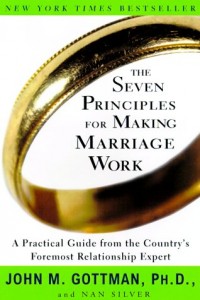by John M. Gottman Ph.D. 1999.
Chapter 1: Inside the Seattle Love Lab: The Truth About Happy Marriages
The determining factor in whether wives feel satisfied with the sex, romance, and passion in their marriage is, by 70 percent, the quality of the couple’s friendship.
At the heart of my program is the simple truth that happy marriages are based on a deep friendship. By this I mean a mutual respect for and enjoyment of each other’s company. These couples tend to know each other intimately—they are well versed in each other’s likes, dislikes, personality quirks, hopes, and dreams. They have an abiding regard for each other and express this fondness not just in the big ways but in little ways day in and day out.
Friendship fuels the flames of romance because it offers the best protection against feeling adversarial toward your spouse.
In the strongest marriages, husband and wide share a deep sense of meaning. They don’t just “get along”—they also support each other’s hopes and aspirations and build a sense of purpose into their lives together.
Chapter 3: Principle 1: Enhance Your Love Maps
Love Maps Questionnaire
1. I can name my partner’s best friends.
2. I can tell you what stresses my partner is currently facing.
3. I know the names of some of the people who have been irritating my partner lately.
4. I can tell you some of my partner’s life dreams.
5. I am very familiar with my partner’s religious beliefs and ideas.
6. I can tell you about my partner’s basic philosophy of life.
7. I can list the relatives my partner likes the least.
8. I know my partner’s favorite music.
9. I can list my partner’s three favorite movies.
10. My partner is familiar with my current stresses.
11. I know the three most special times in my partner’s life.
12. I can tell you the most stressful thing that happened to my partner as a child.
13. I can list my partner’s major aspirations and hopes in life.
14. I know my partner’s major current worries.
15. My partner knows who my friends are.
16. I know what my partner would want to do if he or she suddenly won the lottery.
17. I can tell you in detail my first impressions of my partner.
18. Periodically I ask my partner about his or her world right now.
19. I feel that my partner knows me pretty well.
20. My partner is familiar with my hopes and aspirations.
I appreciate that my partner is:
1. Loving
2. Sensitive
3. Brave
4. Intelligent
5. Thoughtful
6. Generous
7. Loyal
8. Truthful
9. Strong
10. Energetic
11. Sexy
12. Decisive
13. Creative
14. Imaginative
15. Fun
16. Attractive
17. Interesting
18. Supportive
19. Funny
20. Considerate
21. Affectionate
22. Organized
23. Resourceful
24. Athletic
25. Cheerful
26. Coordinated
27. Graceful
28. Elegant
29. Gracious
30. Playful
31. Caring
32. A great friend
33. Exciting
34. Thrifty
35. Full of plans
36. Shy
37. Vulnerable
38. Committed
39. Involved
40. Expressive
41. Active
42. Careful
43. Reserved
44. Adventurous
45. Receptive
46. Reliable
47. Responsible
48. Dependable
49. Nurturing
50. Warm
51. Virile
52. Kind
53. Gentle
54. Practical
55. Lusty
56. Witty
57. Relaxed
58. Beautiful
59. Handsome
60. Rich
61. Calm
62. Lively
63. A great partner
64. A great parent
65. Assertive
66. Protective
67. Sweet
68. Tender
69. Powerful
70. Flexible
71. Understanding
72. Silly
Chapter 10: Principle Six: Overcoming Gridlock
Acknowledging and respecting each other’s deepest, most personal hopes and dreams is the key to saving and enriching your marriage.
The more you can agree about the fundamentals in life, the richer, more meaningful and in a sense easier your marriage is likely to be.
A crucial goal of any marriage, therefore, is to create an atmosphere that encourages each person to talk honestly about his or her convictions.
Afterword: What Now?
Find some way every day to communicate genuine affection and appreciation toward your spouse.
Kiss, hold, and touch each other during the times you’re together. Make sure to kiss each other before going to sleep.
The other source of criticism in marriages comes from within. It is connected to self-doubt that has developed over the course of one’s life, particularly during childhood. In other words, it begins as a criticism of oneself. Aaron cannot really appreciate or enjoy his own accomplishments. When he has a setback in his business, he feels deep down that he is worthless. When his business is successful, he doesn’t allow himself to be proud. There’s a voice inside him that says this is not good enough. He continually searches for approval but cannot enjoy it or even accept it when it is offered.
What happens to Aaron when he marries Courtney? Since he has trained his mind to see what is wrong, what is missing, and not to appreciate what is there, it’s difficult for him to rejoice in what’s right with Courtney or their marriage. So instead of appreciating Courtney’s wonderful qualities, including her sweetness, her devotion, and the deep emotional support she offers him when he is in danger of losing a major client, he focuses on what he considers her flaws—that she is highly emotional, somewhat awkward socially, and not as meticulously clean around the house as he’d like.
The story of Aaron and Courtney is what’s wrong 85 percent of the time in most marriages. If you consider yourself inadequate, you are always on the lookout for what is not there in yourself and your partner. And, let’s face it: Anyone you marry will be lacking in certain desirable qualities. The problem is we tend to focus on what’s missing in our mate and overlook the fine qualities that are there—we take those for granted.

